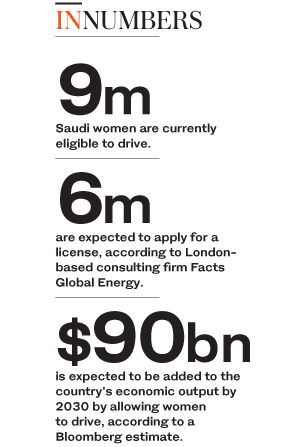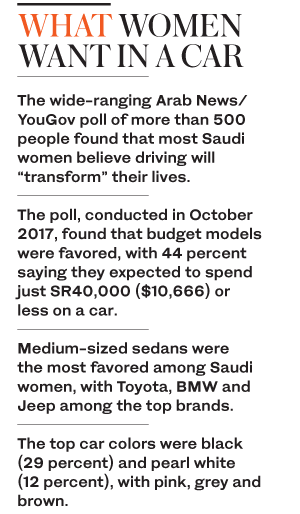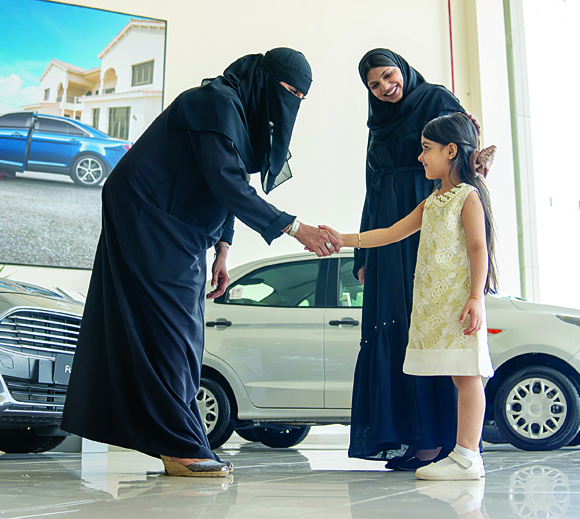JEDDAH: Ever since the long-standing driving ban for women was lifted last September, auto-industry marketers have been scrambling to figure out just what women want. The auto industry has an estimated 9 million potential new customers in the Saudi female population who are now eligible to drive, an (em)powering move that instantly established Saudi Arabia as the world’s largest market for new sales.
 But many Saudi women were less than impressed with the initial ad campaigns. Some felt that these were driven by an emotional play on women’s feelings. Many complained that they focused too heavily on feminine stereotypes, rather than offering any practical information. These campaigns, while witty and creative, lacked any real substance to help women with the necessary decision-making required when buying a vehicle.
But many Saudi women were less than impressed with the initial ad campaigns. Some felt that these were driven by an emotional play on women’s feelings. Many complained that they focused too heavily on feminine stereotypes, rather than offering any practical information. These campaigns, while witty and creative, lacked any real substance to help women with the necessary decision-making required when buying a vehicle.
Jeddah resident Layla Hamdan, 26, spoke candidly with Arab News about which vehicle models appeal most to her and her friends. “A lot of the marketing toward women has been way off-base in my opinion,” she said. “They are appealing to a very feminine stereotype that is not accurate in regards to the cars we prefer.
“Personally, I think pink is one of the ugliest colors for a car. It’s not even so much about style or flash for me either, it’s all about practicality. This is an exciting time for us. A time for freedom and adventure. To be able to explore our great country and go on fun road trips together. For these reasons me and many of my girlfriends prefer larger cars such as SUVs or large hatchbacks.”
Quick to take notice were major players in the auto industry such as Abdul Latif Jameel Motors, General Motors and United Motors Co., which between them boast the authorized rights to sell Toyota, Chevrolet, GMC, Chrysler, Dodge and Jeeps in the Kingdom. These firms have ramped up their advertising and marketing campaigns, too, but have taken a more tactful and considerate approach.
Along with establishing a call center managed exclusively by women to handle finance options and general inquiries, Abdul Latif Jameel Motors, the Japanese group’s authorized Toyota distributor in Saudi Arabia, will be designating showroom lots run by all-female staff.
General Motors, which has exclusive selling rights to Chevrolet and GMC autos in the Kingdom, recently promoted a Saudi-born female advertising executive to be the region’s chief copywriter and assist in crafting advertisement campaigns that are more in tune with women’s preferences.
United Motors Co. is the sole distributor for Chrysler, Dodge, Jeep, Ram, Fiat and Alfa Romeo autos in the Kingdom. Established in 1999 as a merger of United Arab Motors Co. and Al-Essayi Trading Corp., it is one of the largest automotive companies in the Saudi market, employing more than 1,200 trained staff in more than 63 branches.
Arab News spoke exclusively with United Motors Co. sales manager Mohammed Mohsen Al-Amoudi about what types of vehicles Saudi women have been buying from his Jeddah lot, their color preferences and the appeal factor that larger cars have for women.
 “Now that women are allowed to drive in the Kingdom, there is a demand for exclusive offers and packages exclusively geared toward women that have been highly successful for us. We’ve had consistent record-setting months in sales since September. For example, last Ramadan we did not exceed
“Now that women are allowed to drive in the Kingdom, there is a demand for exclusive offers and packages exclusively geared toward women that have been highly successful for us. We’ve had consistent record-setting months in sales since September. For example, last Ramadan we did not exceed
1 percent in sales for women, while this Ramadan it has jumped by
25 percent. The demand has shifted from women clients buying a car for their driver to buying a car for personal use, and we have found them to be just as concerned as men when it comes to the fine details on safety measures, fuel mileage and customized options.”
As far as what vehicle models and color preferences women have, Al-Amoudi said that the market has been overwhelmingly lopsided in favor of larger cars.
“While we have all options available, from elegant and classic selections like our Alfa Romeo, Chryslers and Fiats to our sportier options in our Chargers and Challengers, we have seen the most spike in sales with our Jeep Wrangler. Just last week we sold four cars, all to women, and all were Wranglers.”
On color preference, Al-Amoudi said: “What we have noticed is that women have been requesting unconventional colors. Unfortunately, at the moment most dealerships mainly carry the generic solid colors of black, blue, white, and silver, but we are more than happy to order customized colors to accommodate their preferences.”
With June 24 a mere day away, it’s clear that Saudi women are not the only ones preparing for this big moment. Soon women will be driving on every Saudi road, but don’t expect to spot them strictly by their vehicle choice or color.
“What do women want?” ask marketers. Well, maybe a clue can be found in the popularity of Jeeps. They are tough, secure and highly resistant to extreme conditions. How fittingly appropriate. No argument here.















